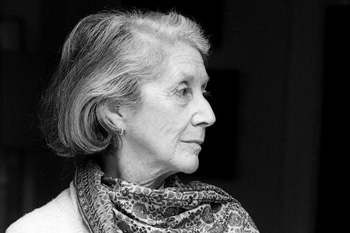
Nadine Gordimer
Photo: Jullian Edelstein |
The staff and students of the University of the Free State (UFS) are greatly saddened by the news of Nadine Gordimer’s passing. We extend our deepest condolences and heart-felt sympathy to Ms Gordimer’s family, friends and loved ones.
Nadine Gordimer – renowned South African author, political activist and recipient of the 1991 Nobel Prize in Literature – passed away on Sunday evening, 13 July 2014 at the age of 90.
The university community had the great privilege of Ms Gordimer delivering the Inaugural Reconciliation Lecture on our Bloemfontein Campus on 7 November 2012. Lauded as one of the literary world’s most powerful voices against apartheid, Ms Gordimer hailed the university for doing things differently from what has been done in the past.
In reference to the transformation underway at the university, Ms Gordimer observed in the Annual Reconciliation Lecture that “The University of the Free State has begun a national culture in so many ways.”
The legacy of Nadine Gordimer will forever remain in the memory of the UFS, its staff and students.